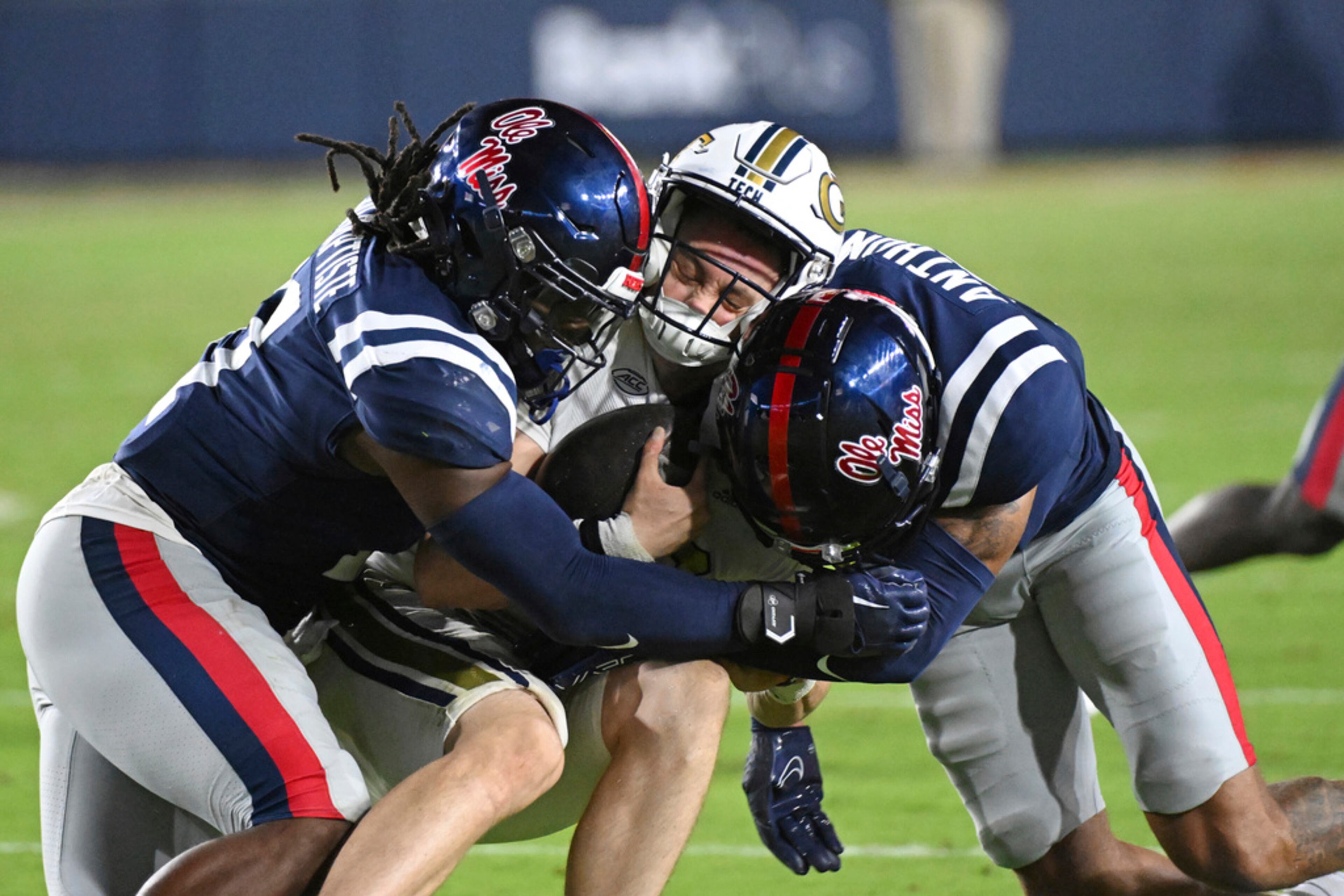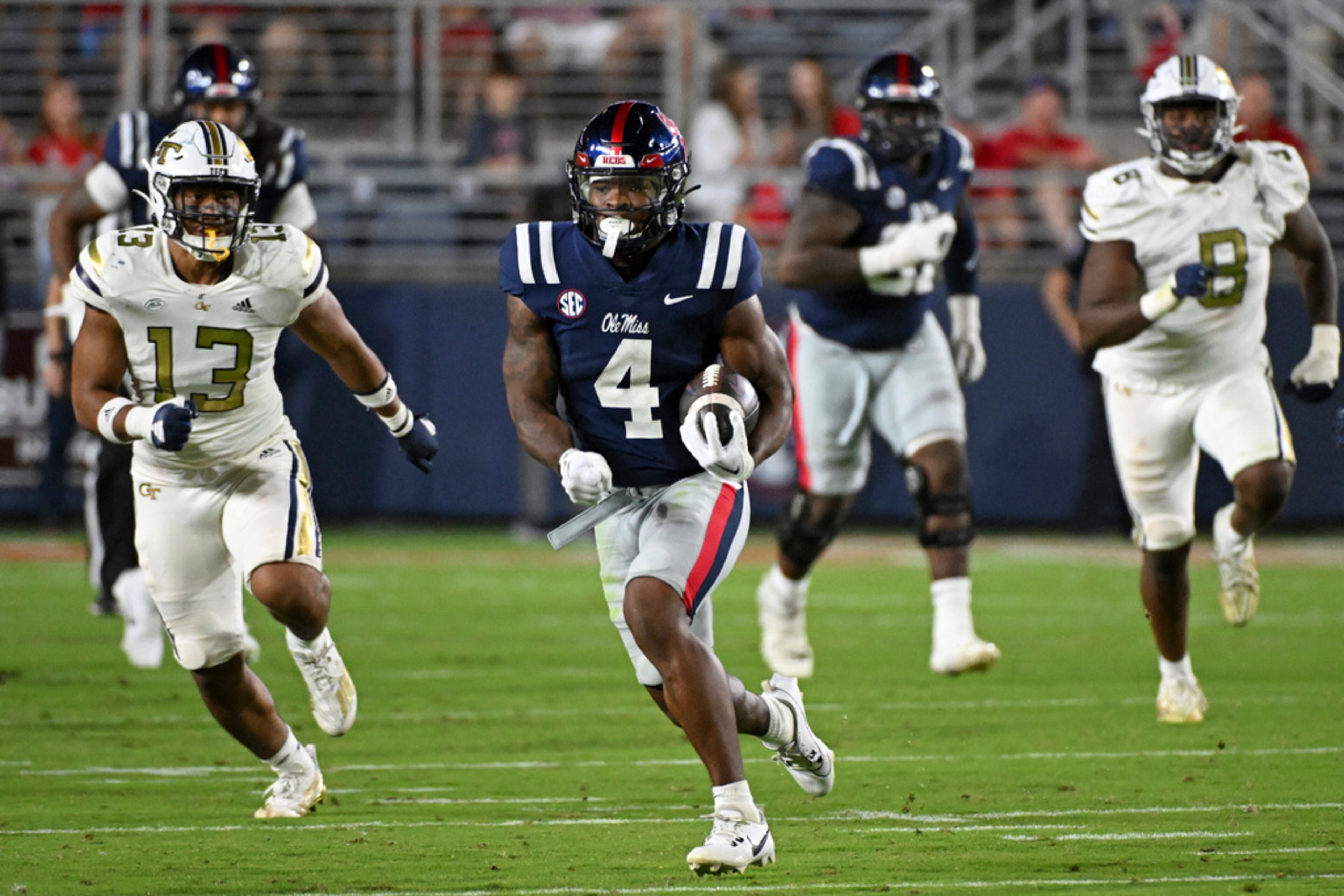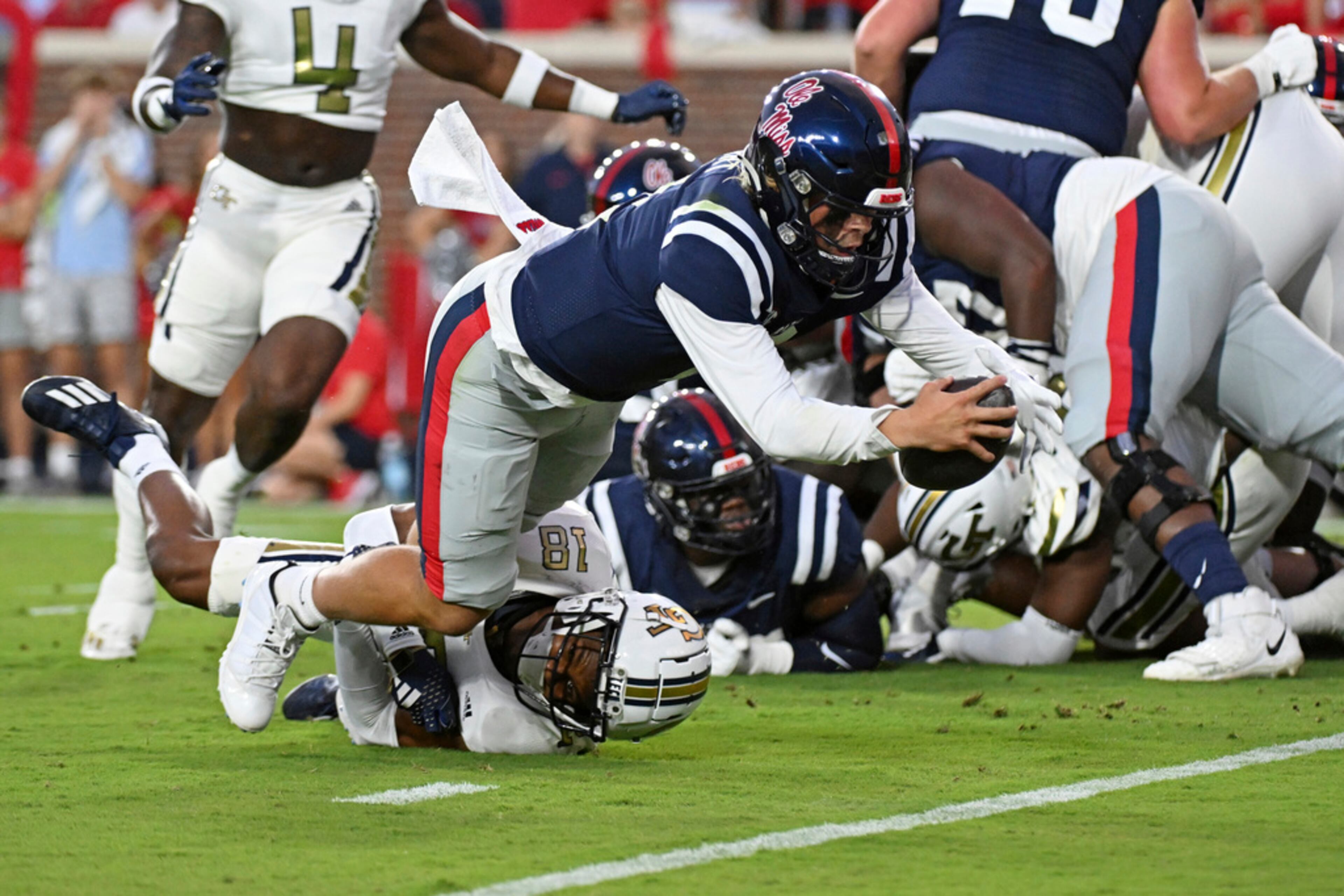Offense looks better, but mistakes and shaky defense undo Georgia Tech





















OXFORD, Miss. — For a moment, belief grew on the Georgia Tech sideline and doubt crept in everywhere else in Vaught-Hemingway Stadium.
Back-to-back second-half touchdowns by the Yellow Jackets had reduced Ole Miss’ lead from a commanding 21 points to a more tenuous seven. A defensive stop would return the ball to Tech with a chance to tie the score and unload serious pressure on No. 17 Ole Miss, which was favored by 16.5 points, playing in front of their red-clad partisans and defending the bruised pride of the SEC.
But then Tech’s defense – and, to be fair, Ole Miss’ explosive offense – wrote the game’s final chapter. The Rebels scored 24 points on their final four possessions, gaining an even 200 yards in only 13 plays.
“We’ve got to be able to sustain and continue to play four quarters, regardless of what the scoreboard says,” coach Brent Key said.
“(Ole Miss coach) Lane Kiffin over there – great play-caller,” safety LaMiles Brooks said. “He had good plays against what we had. And then it came down to execution. We didn’t execute when it was needed the most.”
Tech packed up for the ride home from its first-ever visit to Vaught-Hemingway having been vanquished by a 48-23 count.
Before the game, Key pitched Saturday night’s tussle as a matchup of evenly matched teams. The scoreboard offered a different assessment, as the Jackets dropped their record to 1-2.
There continue to be reasons to think this team can get to six wins and make a bowl game. Offensive coordinator Buster Faulkner called 474 yards’ worth of plays, Tech’s third game in a row with at least that many. According to statistics on cfbstats.com, the last time the Jackets distinguished themselves thusly was 2014, quite arguably former coach Paul Johnson’s finest team.
To compare this game with last year’s debacle against the same Rebels is not meaningful, as both teams are significantly different compared with a year ago. Regardless, when the Rebels clubbed the Jackets last year at Bobby Dodd Stadium, Tech scored no points and gained 214 yards in the waning days of the Geoff Collins era.
The 474-yard output included 97 by freshman receiver Eric Singleton Jr. in a breakout game. Faulkner deftly called for Singleton to run a stop-and-go route on a fourth-and-8 from the Ole Miss 15 that resulted in the touchdown that cut the Rebels’ lead to 24-17 with 10:31 left in the fourth quarter. It was the second touchdown in a row for the Jackets after they had fallen behind 24-3 with six minutes left in the third. Singleton had contributed to the preceding score by using his sprinter speed to get behind the Ole Miss defense for a 51-yard reception.
On the fourth-down touchdown, the Rebels defense had been clamping down on Singleton when he ran hitch routes, which baited the Rebels to bite hard on a pump fake by quarterback Haynes King and allowed Singleton to slip wide open into the end zone to haul in the third touchdown reception of his young career.
Running back Jamal Haynes is another revelation. After two years as a little-used receiver, Haynes switched positions and has run hard and decisively and become a featured member of Faulkner’s offense. He gained 72 yards on 19 carries Saturday and willingly gave up his body to protect King on pass plays.
However, the Jackets were scorched for 550 yards on 56 plays by the Rebels offense. Troublingly, they surrendered 299 rushing yards on 37 carries after Ole Miss had gained a combined 232 in its first two games against Mercer and Tulane. In the season opener, Tech gave up 227 yards on the ground to Louisville in a 39-34 loss. South Carolina State gained 196 rushing yards, more than it had gained against Jackson State and Charlotte in its first two games.
“It’s a combination of everything,” Key said of the defense’s lapses, going so far as to say that the offense had a hand in its counterpart’s shortcomings by not being able to keep the ball for longer.
Repeatedly, the Jackets were pushed off the line by the Ole Miss front. They also could not effectively account for Rebels quarterback Jaxson Dart, who finished with a career-high 136 rushing yards and two rushing touchdowns. It followed last week’s challenges against South Carolina State, when the Jackets had trouble with option run plays that the Bulldogs sprang on them as a surprise wrinkle.
The other big problem for Tech was its series of costly misplays. Arguably the biggest play of the game was a blocked field-goal try on the Jackets’ first drive of the game. A high snap and a breach in the middle of the line allowed Zxavian Harris to block Aidan Birr’s 43-yard try that, if successful, would have tied the score at 3-3. Instead, the blocked kick was booted and muffed and finally returned by Ole Miss to the Tech 34, a field flip of 41 yards. The short field opened the door for Ole Miss to score its first touchdown and gain a 10-0 lead, a 10-point swing.
The Jackets answered with a steady drive highlighted by a 17-yard dart by King to receiver Malik Rutherford to convert a third-and-8. That was followed immediately by a smartly designed pass play to tight end Brett Seither for another 16 yards to the Ole Miss 15.
The drive reached a fourth-and-goal at the Ole Miss 2. Key opted to go for the touchdown, and King threw into the end zone to receiver Dominick Blaylock, who couldn’t secure the catch against a challenge by safety Daijahn Anthony.
Ole Miss 48, Georgia Tech 23
Tech still had Ole Miss pinned in, but a series of missed tackles enabled the Rebels to safely advance from deep in their own end. A 68-yard keeper by Dart – he was able to get downfield through an opening in the pocket, which arguably was a lapse in discipline given that Dart already had proved himself a threat to run – brought the Rebels inside the Tech 10. Ole Miss ultimately came up empty with a dropped pass on its own fourth-and-goal, but a chance for Tech to regain possession with advantageous field position was lost.
On the ensuing possession, Tech again was effective moving the ball as Haynes ran with determination. The 17-play, 90-yard drive was completed with a Birr field goal to put the Jackets on the scoreboard. But Tech missed an opportunity for a touchdown on the series when King threw out of a crumpling pocket to the end zone to receiver Avery Boyd for a potential 37-yard score that could have cut the lead to 10-7. Boyd appeared to have the ball in his hands, but couldn’t secure the 50/50 ball, the ball falling for an incompletion.
That’s a blocked field-goal attempt with a 41-yard change of field position, an empty possession after having first-and-goal and a play that cost the Jackets four points. Tech went into the half down 10-3 when better execution on just a handful of plays could have meant a 17-10 lead.
“Really, the best thing you can ask for in the game of football is a one-on-one,” said Key, speaking of all one-on-one situations, such as an offensive tackle vs. a defensive end, and not just Boyd’s play in the end zone. “And you’ve got to execute those one-on-ones. That’s the challenge we give to the guys all the time.”
Given the Ole Miss onslaught in the second half, when it outscored the Jackets 38-20, might have rendered moot a more effective first half by the Jackets. But a cleaner game could have meant maybe a 41-31 loss instead of 48-23. A cleaner game could have put Ole Miss in position to win the game on its own merits, a result that would be easier to stomach. Instead, the Jackets played the role of generous guest.
The good news for the Jackets is that they may not play an opponent as strong as Ole Miss until their annual meeting with Georgia on the Saturday after Thanksgiving. But, to make up the gap against lesser competition, the defense has to be better and the mistakes fewer in order for the improved offensive play to be meaningful.

